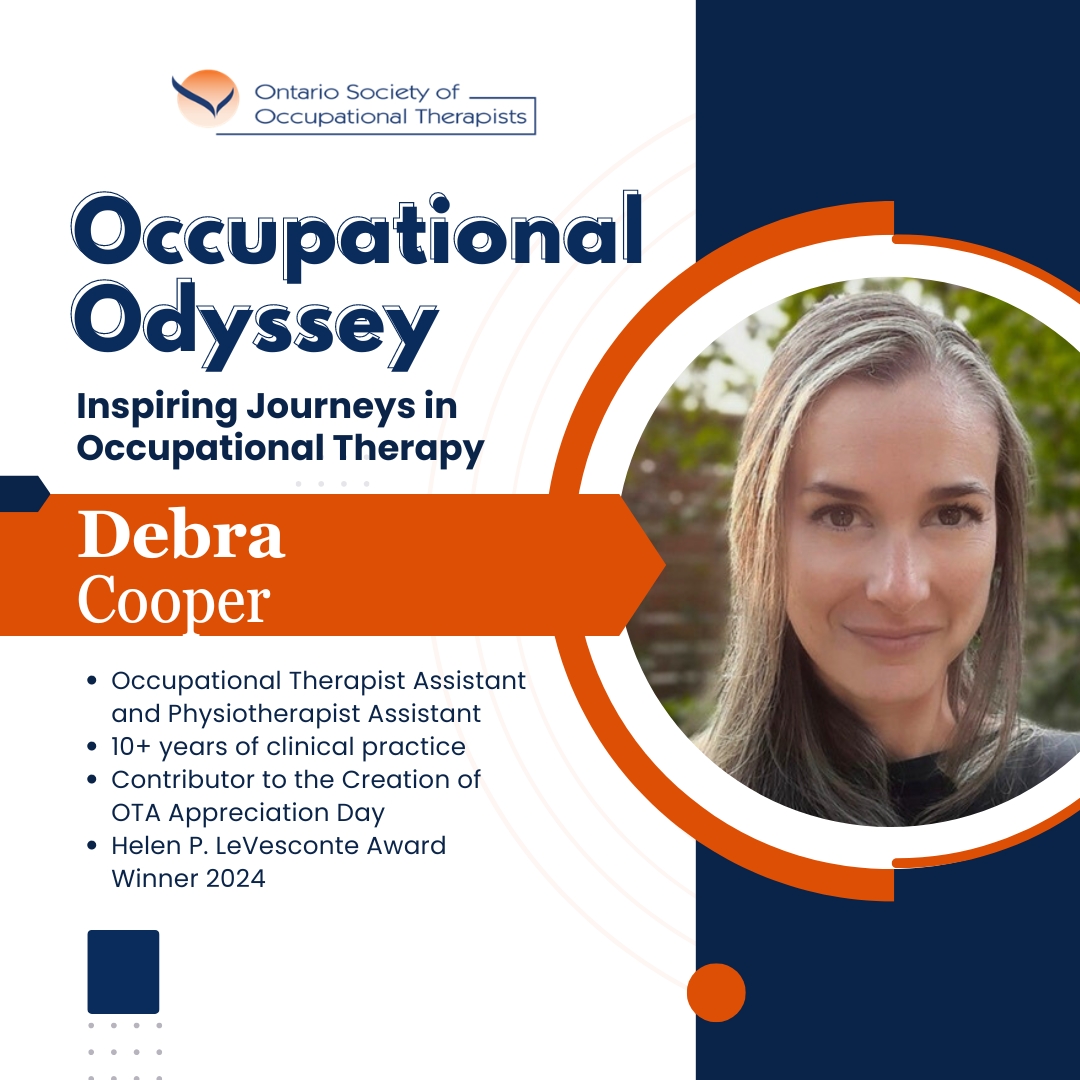Debra Cooper

I would not consider my professional journey to be typical. At the beginning of my decade-long career, I never imagined it would be possible to experience what I have so far. I have been fortunate to discuss practice issues on national, provincial, and local platforms, allowing them to be acknowledged and addressed from the perspective of an occupational therapist assistant (OTA).
I graduated from Centennial College in 2014 with a new-found love for occupational therapy. My first job after graduation was as a lab assistant at the college where I discovered the joy of teaching. Shortly afterward, I began at an acute care hospital working on multiple units that allowed me to develop my craft. I spent the majority of my time in the stroke unit where I took on my first clinical student. From here my passion for student education and neurological rehabilitation blossomed. In 2015, I began working at Toronto Rehab in stroke and brain injury units, before moving to spinal cord injury rehabilitation in 2017. In 2023, I collaborated in creating a role-emerging position in the outpatient seating clinic, where I continued to practice and develop my clinical skills.
Throughout this time,
I had the pleasure of guiding more than 20 students through their clinical placements. I believe they taught me as much about myself as a clinician, as I have taught them practical skills. My aim to create enriching and personalized student placements has truly highlighted the beautiful diversity of the individuals entering the profession. Upon learning of their journeys and reflecting upon my own experiences, I realized that increased OTA advocacy was needed to fully integrate assistants into occupational therapy practice, and to optimize the OT-OTA partnership.
In 2018, I was approached by the Canadian Association of Occupational Therapists (CAOT) to start an OTA and PTA practice network. At the time, I didn’t realize this would lead me to become a voice for OTAs nationally. Since 2020, I have been fortunate to speak at conferences, host workshops, and provide guidance about OTA practice to both OTs and OTAs.
I was given the opportunity to spearhead the creation of OTA Appreciation Day, which takes place annually during OT month.
I have developed two true passions throughout my advocacy work; to build stronger OT and OTA collaborative partnerships, and to celebrate the diversity of assistants while challenging the existing systemic issues within our profession. My vision of what occupational therapy can become with the cohesion of our professions does not come without its hurdles. I have experienced my fair share of pushback and heartache while working towards my goals. Fortunately, I am surrounded by like-minded therapists, allowing me to understand and pursue solutions that benefit both our practices. I believe that by working together as a team, we can expand occupational therapy services to better meet the growing needs of our clients.
I can proudly say that 2024 has been a big year for my career and OTA inclusion in occupational therapy. In February, the Canadian Competencies for Occupational Therapist Assistants were released. I had the pleasure of being a member of the CAOT task force which updated the document to complement the competencies for occupational therapists in Canada. In May, I was surprised and overjoyed to be the
recipient of the “Helen P. LeVesconte Award for volunteerism in occupational therapy in Canada” at the CAOT conference in Halifax.
I was also honoured to join OSOT’s OT-OTA working group and be a part of the discussions of OTA inclusion in Ontario, including being
one of OSOT’s first official OTA members. I am very excited to continue to support them as they pioneer changes to the existing OT and OTA dynamics within the province. I am very fortunate to be able to do all that I love, and I plan to continue to work towards improving the OT-OTA partnerships, as together we can expand the current boundaries of occupational therapy practice.